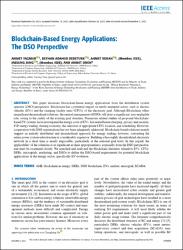| dc.contributor.author | Yagmur, Ahmet | |
| dc.contributor.author | Dedeturk, Beyhan Adanur | |
| dc.contributor.author | Soran, Ahmet | |
| dc.contributor.author | Jung, Jaesung | |
| dc.contributor.author | Onen, Ahmet | |
| dc.date.accessioned | 2022-02-27T10:50:51Z | |
| dc.date.available | 2022-02-27T10:50:51Z | |
| dc.date.issued | 2021 | en_US |
| dc.identifier.issn | 2169-3536 | |
| dc.identifier.uri | https //doi.org/10.1109/ACCESS.2021.3122987 | |
| dc.identifier.uri | https://hdl.handle.net/20.500.12573/1196 | |
| dc.description | This work was supported in part by the Korea Institute of Energy Technology Evaluation and Planning (KETEP) and the Ministry of Trade, Industry and Energy (MOTIE), Republic of Korea, under Grant 20191210301820, and in part by the "Human Resources Program in Energy Technology'' of the Korea Institute of Energy Technology Evaluation and Planning (KETEP) from the Ministry of Trade, Industry and Energy, Republic of Korea, under Grant 20194030202370. | en_US |
| dc.description.abstract | This paper discusses blockchain-based energy applications from the distribution system operator (DSO) perspective. Blockchain has a potential impact on newly emergent actors, such as electric vehicles (EVs) and the charging facility units (CFUs) of the electricity grid. Although Blockchain offers magnificent decentralized solutions, the central management of DSOs still plays a significant, non-negligible role, owing to the reality of the existing grid structure. Numerous related studies of proposed blockchain-based EV systems have investigated the energy costs of EVs, fast and efficient charging, privacy and security, P2P energy trading, sharing economy, the selection of appropriate CFUs location, and scheduling. However, cooperation with DSO organizations has not been adequately addressed. Blockchain-based solutions mainly suggest an entirely distributed and decentralized approach for energy trading; however, converting the entire power system infrastructure is considerably expensive. Building a thoroughly decentralized electricity network in a short time is nearly impossible, particularly at the national grid level. In this regard, the applicability of the solutions is as significant as their appropriateness, especially from the DSO perspective, and must be examined closely. We searched and analyzed the blockchain literature related to EVs, CFUs, DERs, microgrids, marketing, and DSOs to define the DSO-based requirements for potential blockchain applications in the energy sector, specifically EV evolution. | en_US |
| dc.description.sponsorship | Korea Institute of Energy Technology Evaluation and Planning (KETEP)
Ministry of Trade, Industry and Energy (MOTIE), Republic of Korea 20191210301820
Ministry of Trade, Industry and Energy, Republic of Korea 20194030202370 | en_US |
| dc.language.iso | eng | en_US |
| dc.publisher | IEEE-INST ELECTRICAL ELECTRONICS ENGINEERS INC445 HOES LANE, PISCATAWAY, NJ 08855-4141 | en_US |
| dc.relation.isversionof | 10.1109/ACCESS.2021.3122987 | en_US |
| dc.rights | info:eu-repo/semantics/openAccess | en_US |
| dc.subject | Blockchains | en_US |
| dc.subject | Microgrids | en_US |
| dc.subject | Smart grids | en_US |
| dc.subject | Security | en_US |
| dc.subject | Privacy | en_US |
| dc.subject | Power system stability | en_US |
| dc.subject | blockchain in energy | en_US |
| dc.subject | DSO blockchain | en_US |
| dc.subject | microgrid | en_US |
| dc.subject | SCADA | en_US |
| dc.title | Blockchain-Based Energy Applications: The DSO Perspective | en_US |
| dc.type | article | en_US |
| dc.contributor.department | AGÜ, Mühendislik Fakültesi, Bilgisayar Mühendisliği Bölümü | en_US |
| dc.contributor.institutionauthor | Yagmur, Ahmet | |
| dc.contributor.institutionauthor | Dedeturk, Beyhan Adanur | |
| dc.contributor.institutionauthor | Soran, Ahmet | |
| dc.identifier.volume | Volume 9 Page 145605-145625 | en_US |
| dc.relation.journal | IEEE ACCESS | en_US |
| dc.relation.publicationcategory | Makale - Uluslararası - Editör Denetimli Dergi | en_US |


















